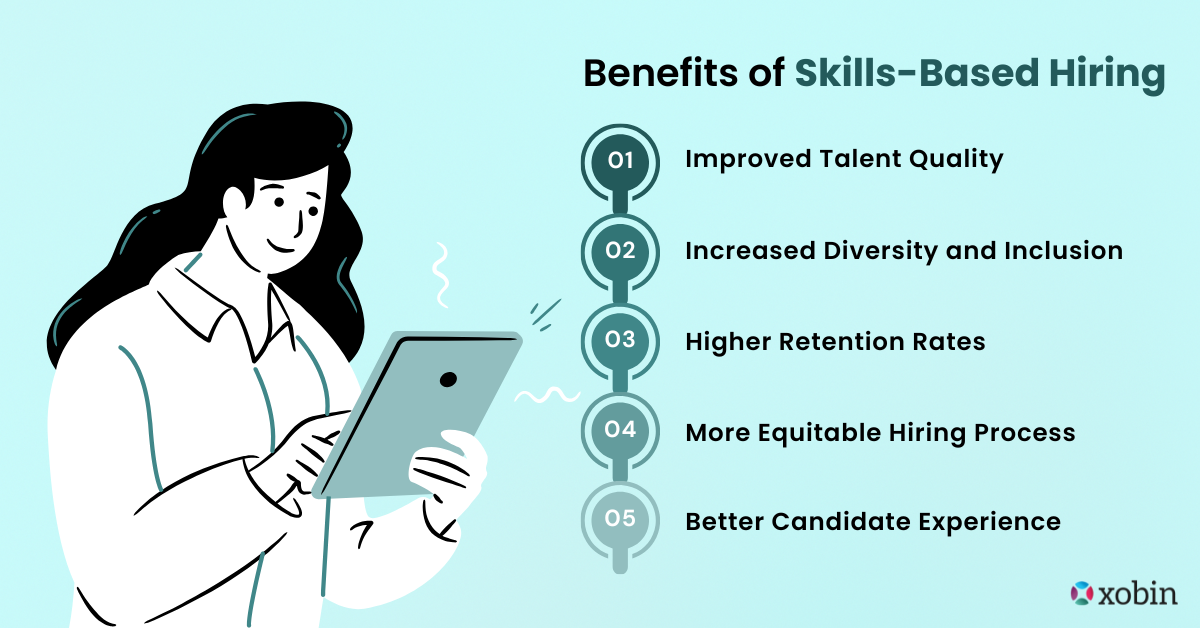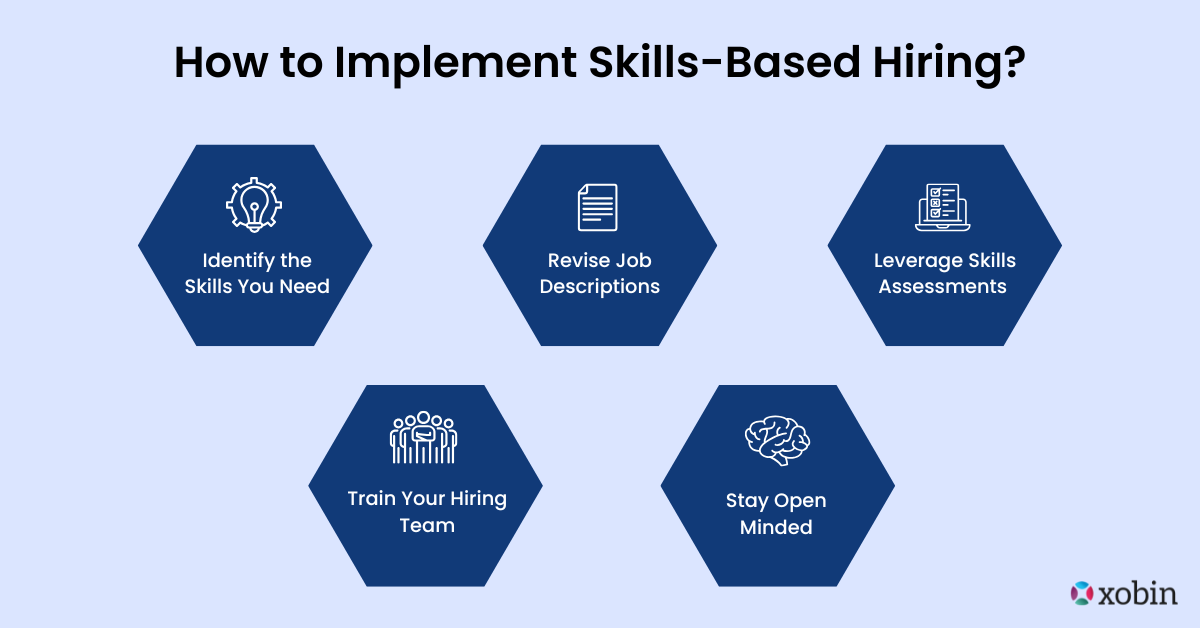Recruiting top talent has never been more competitive. In today’s dynamic job market, companies must identify candidates who not only fit the culture but also possess the right skills-based assessments to perform. Traditional hiring practices are giving way to more innovative approaches like skills-based hiring, a model that focuses on a candidate’s real-world abilities rather than their job title or education history.
Table of Contents
The credit goes to pre-employment skills testing; companies now make informed hiring decisions, improve talent acquisition outcomes, and build high-performing teams. If you’re looking to future-proof your workforce, skills-based recruiting is the game-changer you’ve been waiting for.
In this blog, we’ll explore what skills-based hiring is, why it’s gaining momentum, the benefits it offers, and how to adopt it within your organization. Let’s get started.
What is Skills-Based Hiring?
Skills-based hiring is a recruitment approach that evaluates candidates based on their skills and competencies, not their degrees or previous job titles. Unlike traditional models that rely heavily on resumes, this strategy prioritizes pre-hire skills assessments, hands-on tests, and scenario-based evaluations.
This approach is simple yet revolutionary. Candidates are assessed for practical proficiency in areas like communication, problem-solving, technical abilities, and emotional intelligence. This ensures companies hire talent that can perform from day one.
Example of Skills-Based Hiring Practices
A software development company hiring a software engineer can benefit from a skills-based hiring approach. Instead of prioritizing degrees like a bachelor’s or master’s in computer science and past job titles, recruiters evaluate candidates using skills-based hiring tools such as coding assessment tests. They assess a candidate’s proficiency in programming languages such as Python, JavaScript, or C++ and their ability to solve problems and build scalable applications.
Rather than requiring a formal degree, recruiters can evaluate candidates through coding tests or real-world coding challenges during the interview process. This hands-on assessment provides deeper insights into a candidate’s capabilities beyond academic qualifications. Someone without a computer science degree but with self-taught programming skills and years of experience developing apps or websites might be a stronger fit for the role.
Why Skills-Based Hiring Is on the Rise?
The shift toward skills-based hiring is on the rise due to evolving workforce dynamics and the need for real, demonstrable skills. Here’s why organizations are moving in this direction:
1. Work Is Changing Fast
With the advent of new technologies, automation, and digital transformation, the skills requirements in the workforce are rapidly evolving. Hiring for skills ensures businesses adapt quickly by employing individuals equipped to thrive in digitally driven environments.
2. A Boost for Diversity and Inclusion
By removing the bias of academic pedigree, skills-based hiring practices open doors for underrepresented talent, allowing equal opportunity for all who possess the required abilities.
3. Addressing Industry Skill Gaps
Industries like tech and healthcare face acute skill shortages. Skills-based recruitment helps identify capable professionals, even if they lack conventional credentials.
4. More Cost and Time Efficient
Skills assessment software speeds up the hiring process and reduces hiring costs by identifying job-ready candidates early.
Benefits of Skills-Based Hiring

Adopting skills-based hiring can bring numerous benefits to both employers and job candidates. Here’s why this approach is rapidly becoming the preferred method for talent acquisition:
Improved Talent Quality
Evaluating fundamental skills improves hiring accuracy. Candidates who excel in skills-based assessments are more likely to succeed and stay longer.
Increased Diversity and Inclusion
By focusing on skills, not resumes, companies attract candidates from varied backgrounds, making teams more innovative and inclusive.
Higher Retention Rates
Employees selected via skills testing are often more engaged and better aligned with their roles, leading to lower turnover.
More Equitable Hiring Process
Skills-based hiring software standardizes evaluation criteria, removing subjectivity and fostering an inclusive hiring experience.
Better Candidate Experience
Candidates appreciate the transparency of being judged by their capabilities rather than their background. This enhances employer branding and candidate engagement.
Do Degrees Still Matter in Hiring?
With the rise of skills-based hiring, many wonder about the value of academic degrees. Here’s the truth:
Employers Prioritize Practical Skills Over Theory
A degree offers theoretical knowledge, but modern workplaces demand candidates who can apply their skills immediately. Companies now seek employees who can solve real-world problems from day one. As a result, skills-based hiring emphasizes hands-on experiences, skills tests, and on-the-job simulations over academic credentials.
Alternative Education Paths Are Gaining Recognition
Online courses, boot camps, and certifications provide candidates with job-ready skills without requiring a college degree. Many employers now recognize these non-traditional learning paths as valuable alternatives. This shift has expanded opportunities for skilled professionals who may not have pursued formal education.
Less Reliance on Degree-Related Biases
Relying less on degrees helps companies minimize biases toward specific schools or prestigious institutions. A skills-first approach widens the talent pool, fostering inclusivity and ensuring a fairer hiring process. Businesses benefit by gaining access to a more diverse and capable workforce.
“It is said, degree-based hiring still applies to fields like medicine or law. However, for many positions, skills-based hiring offers a more effective and fair approach to talent acquisition“
How to Implement Skills-Based Hiring?

Now that we’ve explored the benefits and importance of skills-based hiring, let’s look at how you can implement it in your organization. Here’s a step-by-step guide:
Identify the Skills You Need
Start by clearly defining the key skills required for each role in your organization. This could include both hard skills (e.g., technical skills, coding, data analysis) and soft skills (e.g., communication, leadership, adaptability). Having a clear understanding of what skills are essential for success will help you build a more effective recruitment strategy.
Revise Job Descriptions
Update your job descriptions to focus on the specific skills significant for the role rather than emphasizing qualifications, experience, or education. Use language that clearly communicates the requisite skills and the outcomes that you are expecting from the candidate.
Leverage Skills Assessments
Leverage skill-based hiring assessment solutions such as coding tests, case studies, and psychometric evaluation. These assessments can be tailored to reflect the specific skills you’re looking for in each role.
Train Your Hiring Team
Ensure your recruitment team is trained in skills-based hiring practices. They should be familiar with the types of assessments you’ll be using and how to evaluate candidates based on their skills. This will help make the hiring process more consistent and effective.
Stay Open-Minded
Embrace a more open-minded approach to hiring. Consider candidates from diverse educational backgrounds, work experiences, and industries who may possess the skills needed for the role. Don’t limit your pool of candidates based solely on traditional qualifications.
Skills Over Degrees: The Future Is Now!
The hiring landscape is evolving, and skills-based hiring is leading the charge. By emphasizing what candidates can do rather than where they’ve been, you’ll attract stronger talent, improve diversity, and foster innovation.
If you’re ready to abandon outdated methods and embrace more innovative hiring, now is the time to integrate skills-based hiring software into your process.
Ready to transform your hiring strategy? Book a personalized demo today and start hiring based on skills, not just resumes.






